On October 23, 2019, partners for Progressive Israel conducted a webinar in its monthly series, “Conversations with Israel and Palestine,” focusing on the situation in the Gaza Strip. This is an abridged and edited version of that Conversation. A recording of the full Conversation, running approximately 1 hour, can be found at here.
Daniel Nerenberg: My name is Daniel Nerenberg, and I’m the communications manager for Just Vision, a nonprofit dedicated to increasing the power and reach of Palestinians and Israelis who are working to end the occupation and build a just, free, and equal future. Tania Hary is the executive director of Gisha, a legal center championing freedom of movement. Mkhaimar Abusada is an associate professor and chairman of the department of political science at Al-Azhar University in Gaza. Tania, last year you wrote an article in The Jerusalem Post that stated that most Israelis and many Americans falsely believe that Israel left Gaza in 2005 when it pulled its troops and settlers from the territory. Few realize that Israel controls almost every aspect of life there.
Tania: Unfortunately, the situation in Gaza is not getting the attention it deserves. Gisha means access or approach in Hebrew, we were founded in 2005, before the disengagement, to look at what Israel’s responsibility would be to residents of Gaza in the new situation disengagement created. We knew that it would be different from the West Bank, but you really didn’t have to be a fortune-teller to know that Israel would maintain control over movement and access, on the ground, by sea, in the air, and especially its control over the Palestinian population registry, and more. You can group these into categories of movement and access, but it really filters down into almost every aspect of day-to-day life. We believe owes responsibilities because of that level of control.
Mkhaimar: As a resident of the Gaza Strip, I know that what Tania says is true. Israel ‘disengaged’ from the Gaza Strip but it still surrounds the Gaza Strip from three sides; from the north and east sides and from the sea. This Israeli siege, which was imposed on Gaza after Hamas won the Palestinian elections in January 2006, was tightened after Hamas seized power in Gaza in the summer of 2007. It has turned Gaza as the biggest open-air prison on the face of Earth. Only a very limited number of Palestinians are able to reach the West Bank although, according to the Oslo Accords, the West Bank and Gaza Strip are considered one territorial unit. Egypt also limits access at the Rafah Border Crossing to the south. At least 70% of the two million Palestinians in the Strip rely on food aid from UNRWA (the UN Relief and Works Agency) and from the WFP (the World Food Program). More than half of the Palestinians in Gaza are unemployed; youth unemployment is about 65%. In 2012 the UN issued a report asserting that Gaza wouldn’t be a habitable in 2020, which is not far off. Life is miserable here in Gaza in terms of electricity, potable water, health care, schooling, access and movement, poverty, unemployment, and more.
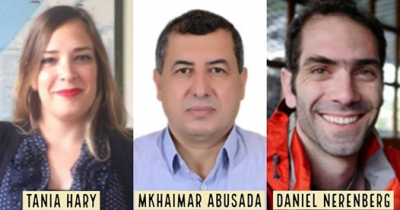
Daniel: Given that it doesn’t seem as though Israel is likely to end the blockade any time soon, are there ways that humanitarian relief efforts can actually make significant changes short of being a political movement?
Mkhaimar: The two-state solution is just fading away for a number of reasons, including numerous provocations from Israel, such as the siege and blockade against Gaza, and Netanyahu’s recent promise annex West Bank settlements. Also, I have to admit that the Palestinian support for the two-state solution is getting less and less attention in the face of Israelis Still, let me say that we, the Palestinians, certainly we the Palestinian moderates, are still hopeful of a two-state solution, and are supporting a Palestinian state and the West Bank and Gaza that live in peace and security alongside the state of Israel.
Gaza is suffering as a result of three parties. One is the Israeli siege and blockade against Gaza as we have described earlier. Second, as a result of the PA punitive measures which had been introduced by the PA about two and a half years ago, starting from April 2017, when the PA cut down the PA salaries, cut down on the number of Palestinian patients who are referred to Israeli hospitals and to West Bank hospitals, and also sent many PA public servants into early retirement. That has led to catastrophic daily conditions for the Palestinians.
Also, the two million Palestinians who live in the Gaza Strip are being held hostages by Hamas who is ruling as an authoritarian entity in the Gaza Strip with no civil liberties and no political rights. We remember what happened to the Palestinians who revolted against Hamas in March of this year and how Hamas security services have dealt with them in a very brutal way, against journalists, human rights activists, and against the Palestinian civilians in general.
It is the duty of the international community to intervene and put pressure on Israel to alleviate its siege and blockade against the Gaza Strip and also, and it’s the responsibility of the international community and especially the EU to put pressure on the PA to alleviate its punitive measures against Gaza and to try to encourage more and more countries like Qatar who are investing in the Gaza infrastructure.
Tania: I do think it’s important to take a step back and acknowledge, if it’s not obvious, that what’s happening in Gaza is a man-made crisis. It’s not a natural disaster. At the end of the day, a man-made crisis has man-made solutions or as I sometimes like to say, maybe women-made solutions.
I think that we should acknowledge that there are technical things that can be done and improved in the meantime. At the same time, let’s ask what policy changes need to happen, so that we’re not just plugging holes in a ship that’s sinking but steering a course to somewhere. Another point of context and to connect to what Mkhaimar said: no one actor in this picture, not the PA, not Hamas, not Israel, not the international community can operate alone to fix the situation.
I think that most people in Gaza, Mkhaimar, correct me if I’m wrong, if you ask them, “What’s one of your most pressing concerns?” They’re going to talk about their daily lives and they’re going to talk about electricity. Everything connects back to electricity. I think that that is something certainly that needs to be paid attention to. The question of infrastructure. Electricity is everything, access to water, the sewage treatment network, education, everything. I think that right now, we’re in a situation where things are a little bit better than they have been in the past. Gazans get eight, sometimes even 12 hours of electricity per day while a little while ago they were just down at three to four hours per day. That’s because Qatar stepped in and it’s paying for fuel that is being brought in for Gaza’s power plant. But, again, it’s a temporary fix.
If you look at the situation of the economy, electricity is one input, and the other major input is movement and access. I think it’s something that people sitting in Brooklyn or Tel Aviv take for granted, but it’s really the key to everything in your life, including things that are invisible to you, like the way that your goods end up in your supermarket and your ability to engage in trade.
Many people on this call might think, “Well, what about security? Isn’t everything related at the end of the day to security?” I would like security to be the only bar when we’re talking about movement and access. That’s very far from the case. Really, so many other factors come in to play, including political decisions and calculations about putting pressure on the population, about protecting markets, about, for example, excess products inside of Israel being dumped on the Gaza Strip. Security is certainly not the only factor even though it should be.
My sense is that people in Gaza feel that there is nothing that is positive, that there’s no solution on the horizon for them. I think that something we really need to do as Israelis, as Palestinians, as members of the international community is to restore hope for young people, especially to show that they are seen, that they are heard, that Gaza is part of the picture, that there are two million people living there and that they will be taken into account, that they will not be forgotten.
Daniel: What about the possibility of new elections, either round three in Israel or the possibility of PA legislative elections? Are these possible signs of hope?
Mkhaimar: Well, let me start by saying that hope is the only thing that keeps many people like me in the Gaza Strip. If we lose hope, it means that people are just going to leave. Many thousands have left. They are already in Turkey, or some have already reached Europe because they have lost hope. Speaking of all-Palestinian elections, it’s something that all the Palestinians are calling for. But most Gazans are not looking to elections as a solution and not very optimistic about the possibility of holding elections in the West Bank and Gaza for a number of reasons. First of all, the Palestinian president has indicated that he’s going to call for only legislative elections for now. That is not acceptable to Hamas at all. Hamas is saying that either there will be elections for the presidency and for the legislative branch or there will be no elections. But more important perhaps than elections themselves, we are saying, “Before we go into elections, we, the Palestinians have to agree on the day after elections.” Because we don’t want to find ourselves in the same position as after the 2006 elections when Hamas won the elections and the international community refused to accept the results, and proceeded to isolated Hamas and the PA. Another issue is whether Israel will allow the Palestinians in East Jerusalem to participate. I think we really need a Palestinian national dialogue to try to reach an understanding or as we call it in Arabic, mithaq sharaf or an oral agreement or consensus to respect the results of any future elections in the Palestinian territories.
Tania: I tend to be a fairly optimistic person. That said, I’m not very hopeful that either a government formed by Netanyahu or by the opposition Blue-White Party would be significantly different on this particular issue. Moreover, I think there are people who are determined to implement a certain vision in this region based on a concept of fragmenting the Palestinian population. We’ve already seen it being implemented over a number of decades. The peace of Gaza is the isolation of Gaza. Hamas coming to power certainly sealed the deal, but well before Hamas came to power, we already saw extreme restrictions on movement, inability to travel between Gaza and the West Bank, to relocate from Gaza to the West Bank.
I think that all of these tools of separation have led us to where we are today and have also paved the way for a negative vision of a different kind of two-state solution than what we’ve seen in the past, which would be Israel and the West Bank as one entity and Gaza as a separate entity. That’s the bad news from my perspective.
That said, there’s more talk about bringing stability to Gaza. You’ll often hear people say that neither of the parties want another war, they don’t want another military operation. From my perspective, Israel is managing the situation in a way to keep things quiet, to keep things calm. At the same time, what we’re seeing is the desire to keep the pot of water very, very hot but keep it from boiling, such as expanding the fishing zone in the last year, adding more permits for traders or even laborers recently. Yes, I am really scrounging for some optimism, but I think that the idea is to go to a situation where there is an agreement that it’s not okay to experiment with people’s lives, it’s not okay just to manage the situation. People in Gaza, and in the West Bank as well, deserve to live. They deserve not just to survive but to thrive. I think it’s about recognizing the situation on the ground and not being satisfied just with a few more nautical miles or a few more hours of electricity. Not saying the humanitarian situation is good enough as it is if people aren’t openly dying in the streets, it’s saying that people have the right to aspire to the highest standard of living possible. I think as civil society organizations, certainly, we have a role to play in articulating this vision.
Daniel: What do you think the odds are that the Rafah Crossing between Gaza and Egypt, will remain open long-term? How are young people able to leave Gaza, and where are they going to?
Mkhaimar: Between 2013 and May 2018 was opened two or three days every two or three months. Very limited number of Palestinians were able to move in and out of Gaza during those years. The situation right now is much better. Egypt opened Rafah Crossing as a result of the deteriorating humanitarian situation in Gaza. And it came about as a result of mutual security understandings between Hamas and the Egyptians. Rafah is open five days a week between Sunday and Thursday, around 300 to 350 people are able to leave from Gaza on daily basis to Egypt and from Egypt they make it to the outside world. Still, there are thousands of Palestinians who are registered to travel or leave Gaza, and they have to wait on average about two to three months to be able to leave.
Overall, the situation in the last year-and-a half is, I think. under the control of the Egyptian army, in spite of the fact that a number of terrorist attacks were launched by ISIS against the Egyptian army. Some people say that the opening of Rafah is a good thing, and others say the opposite. That’s because, as a result of the opening of Rafah, thousands of Palestinian youth have already left Gaza on a one-way trip with no hopes of bringing them back because of poverty, unemployment, and the other problems which we have discussed.
Overall, I think Rafah will stay open and we will probably see more and more people leaving Gaza to Egypt, and going on to Turkey or Europe. But this can be a very deadly trip, and some Palestinians lost their lives in their trip from Gaza.
Tania: Rafah, of course, doesn’t connect to the West Bank and certainly not to Israel. Rafah is an important access point to the outside world, but it can’t connect to other Palestinians in the West Bank, and to the relatively resource-rich West Bank. Of course, from Gaza, it’s now easier to get to Turkey, to China, or to the US than it is to get to Ramallah, which illustrates how deep the separation is between Gaza and the West Bank. And Palestinians need visas to go to most places in the world. Egyptians do not want the Palestinians to stay in Egypt. You may have seen reports that in Belgium recently it was reported that after Syrians, people from Gaza are the next largest group of people asking for asylum. At the same time, there’s a bit of a pushback. We are hearing about several European countries trying to send people back to Gaza.
Daniel: Do Gazans feel that the Great March of Return in the spring and summer of 2018, these demonstrations on the border with Israel, have been an effective political tool of resistance to lift the siege and procure human rights, or rather just a political ploy by Hamas to gain greater control over the population?”
Mkhaimar: I’m not really sure. The Great March of Return started as a non-partisan Palestinian movement to try to bring to the attention of the international community and the neighboring countries that there is a humanitarian crisis in Gaza. It was intended to put pressure on Israel, to alleviate the daily conditions of Palestinians in Gaza.
It certainly brought the issue to international attention, even in the United States, but the price the Palestinians have paid is very heavy, almost 300 Palestinians killed and thousands injured. In the end Hamas hijacked this protest by influencing and manipulating the protesters for their own agenda. There’s no dispute about the fact that Hamas is now in very much in full control of the Great March of Return, but this is not how it started.
Daniel: What power does the international community have over Israel, since any significant policy move will come down to Israel’s choices?
Tania: I do think that it’s important for the international community to use its leverage. It’s certainly true that without international aid, without the support that is flowing into the Gaza Strip from different countries, we would be in a different situation. We would be having a different conversation. Aid is very much propping up the situation. I think it’s a very false sense of stability that there is in the strip today. As Mkhaimar mentioned earlier, about 70% of the population relies on humanitarian aid, including food aid. If that aid disappears, we’re in a very desperate situation. I think that the fact that the international community is essentially footing the bill, that they’re essentially keeping the population alive, should give them a lot more leverage to speak openly about the fact that the situation is unsustainable.
The sense I have increasingly is that there is quite a bit of fatigue in the international community. Crises elsewhere are drawing the international community’s attention, certainly in the US. You have your own issues that you’re dealing with and following domestically, and the situation of Israel-Palestine is less and less central, it’s less and less important. For the moment the aid situation is more or less stable, certainly after many countries rallied after the US pulled its support for UNWRA, but that situation is not sustainable.
I do think that the international community has a responsibility not just to throw money at the problem, but to actually articulate a clear vision for what needs to happen. Gisha doesn’t have a position on the political solution to the conflict, but we very much have a position on the question of people’s human rights, on the question of dignity, on the question of how people can live their lives.
I think that there is much that can be done, as noted earlier, that could transform the situation. Even absent the broader political questions, I think that the international community could be doing quite a bit more; to demand, for example, greater movement and access that would allow the economy to function, allow infrastructure to function, allow people to live their lives with dignity.
Daniel: Can you talk about the gender implications of the situation in Gaza?
Mkhaimar: Arab society very much discriminates against women. I think that women’s rights and the status of woman in the Palestinian territories in general, is much better than in many countries in the region. There’s no doubt that women in Gaza are very much restricted in many aspects of life since we are speaking of a very conservative society. Palestinian women haven’t received the dignity and honor and respect that they should get in return for their fight against the occupation, and for their outspokenness in Gaza against authoritarian rule by Hamas and its security services.
Tania: I do want to say just add to that, for Gisha, this is a subject that is near and dear to us. We will be publishing, I hope, a gendered analysis of the criteria regarding movement of people. Just to give one example, we’ve touched on the issue of permits for what are referred to as business people or traders. Unfortunately women, professional women who are working in civil society and small businesses, are not eligible for permits for professional reasons. It’s simply not a criteria, it’s not a category for which you can apply for a permit. This is something that can change overnight with a policy decision, and I think it really has nothing to do with Israeli security, and has everything to do with how we can take steps to improve the situation for everyone in the region.
Daniel: Thank you Tania for that. I want to thank both of you, Mkhaimar Abusada and Tania Harry for joining us, for offering us your insights. You can go to progressiveisrael.org to learn more about Partners for Progressive Israel and their future programs.
Thanks to Peter Eisenstein, a historian and a member of Partners’ Board of Directors, for editing and condensing this discussion. The full video is available on the Partners’ website here.
___

Peter Eisenstadt is an independent historian who lives in Clemson, South Carolina. He is completing a biography of the African-American religious thinker Howard Thurman, to be published by the University of Virginia Press.

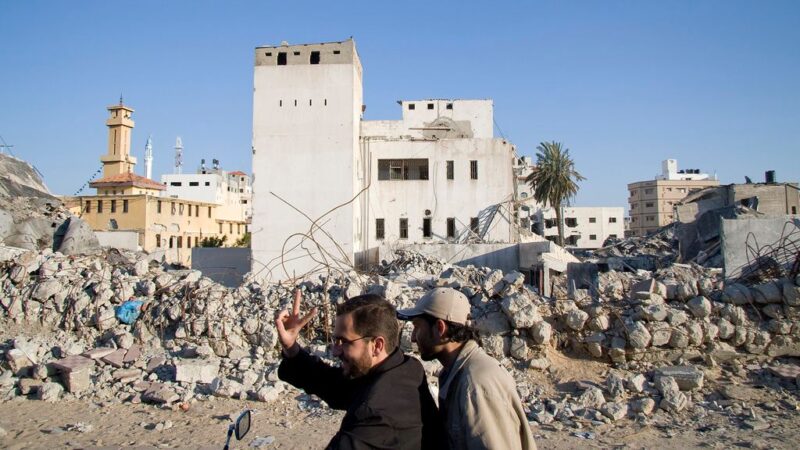
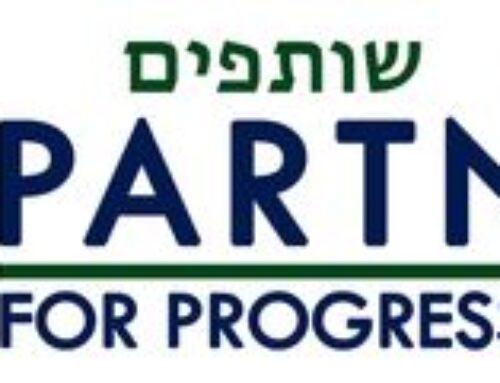

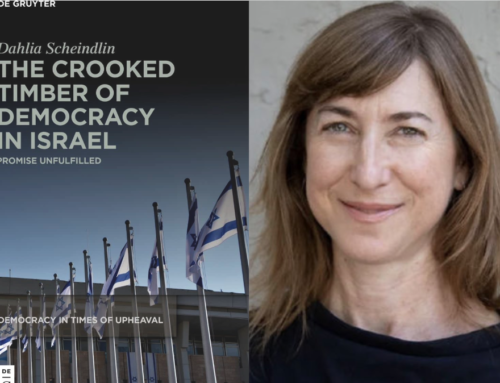
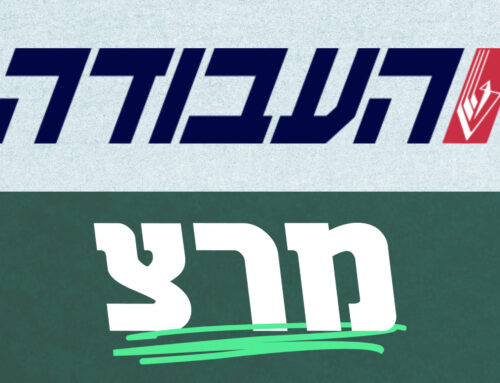

Leave A Comment